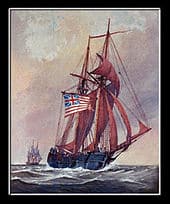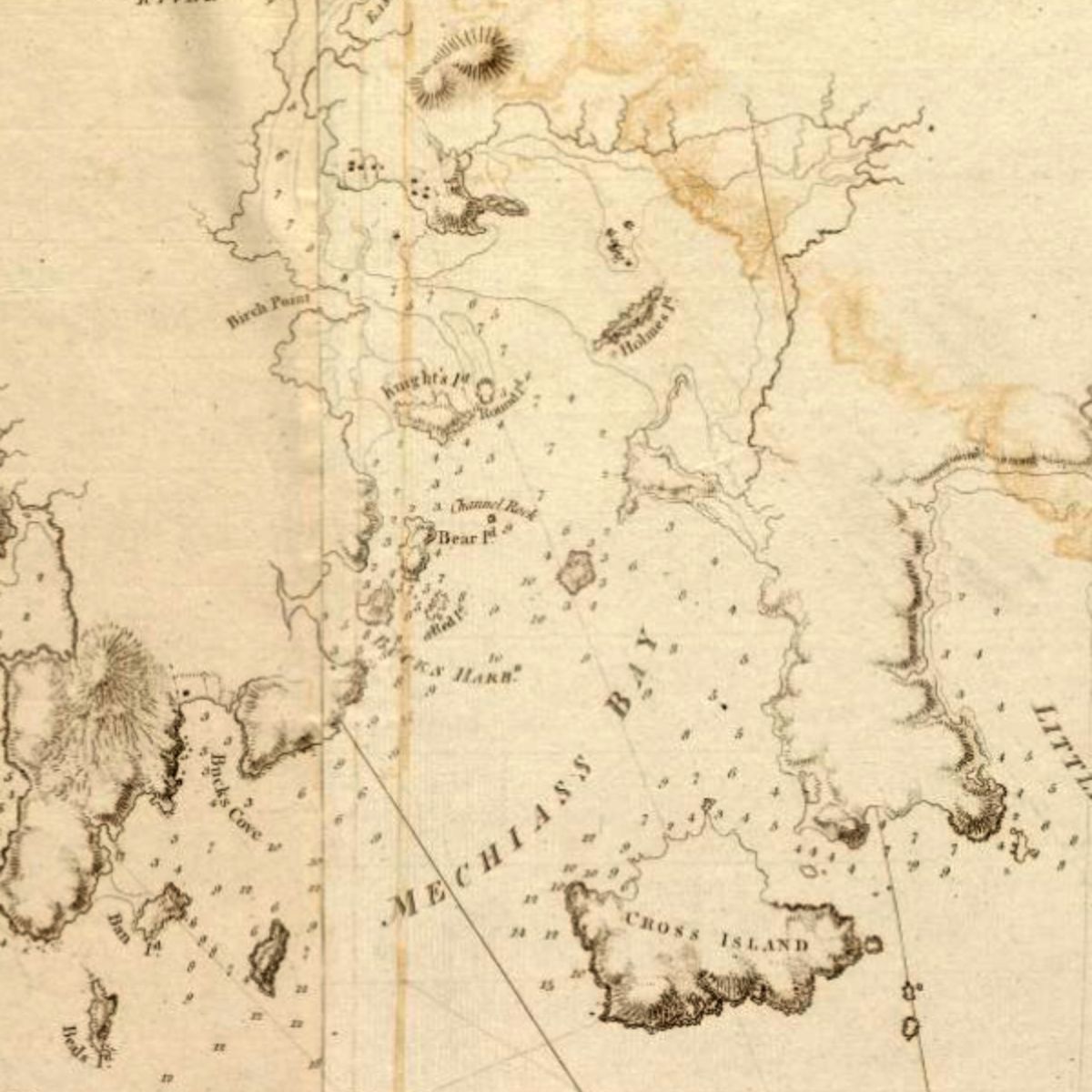The Battle of Machias took place during the Boston Campaign and is recognized as the first naval engagement of the American Revolutionary War. The battle took place around the port of Machias, which was in modern-day Maine.

The British loyalist and wealthy merchant Ichabod Jones, was enlisted by the British to help acquire supplies to help aid the army during the siege of Boston. Ichabod was a resourceful merchant with many connections, yet unaware of what supporting the crown would do to his business.
Many of the residents of Machias were displeased with Jones's business practice and planned to arrest him. Jones, unaware of the plot, landed at Machias and was arrested. The residents seized his ship and armed it. An armed British schooner under the command of James Moore had escaped the harbor. The residents of Machias sailed out to meet him, and the Battle of Machias had begun.

The British Dilemma
After the Battles of Lexington and Concord were pinned down in Boston with limited supplies. They were able to acquire supplies from Nova Scotia and locally from Hog and Noddle Island. The Battle of Chelsea Creek eliminated the opportunity to supply their army with local supplies, so their reliance on merchants increased. General Thomas Gage was surrounded, out-gunned, and forced to rely on supplies from the sea. Even so, the rebels could not capture the British since Gage had wisely defended his position, and the rebels did not command the heights of Boston with any artillery.
Thomas Gage and Admiral Samuel Graves knew that to provide better living quarters for their soldiers and create a stronger defense, there would be a greater need for more barracks. Gage had already sent for reinforcements, and General William Howe, Henry Clinton, and John Burgoyne were already on their way to Boston. However, the rebels had pinned Gage down, and he was unable to acquire the necessary supplies. It was then that he and Graves enlisted the aid of the Tory merchant from Machias, Ichabod Jones. Graves gave Jones a shipment of flour and other supplies to the town of Machias in exchange for lumber. He sent James Moore, who commanded the British schooner, Margaretta, to make sure the exchange took place. Graves also gave orders to Moore to find the remains of the HMS Halifax and recover its weapons.
Arrival
Upon arriving at Machias, Ichabod Jones began to try to barter a deal with the residents. At first, the residents refused to do any business with Jones, and this resulted in Jones threatening to fire on the town unless they agreed to the deal. The residents met again and agreed to go through with the deal.
Ichabod Jones, a proud and wealthy man, made the costly mistake of refusing to do business with those who did not vote in favor. The result was disastrous. Among those who had voted against Jones was the militia leader, Benjamin Foster. Foster and his militia prepared to seize Jones while he was attending church during a June 11 service. Jones learned of the plot and escaped to the woods. Foster then boarded the Unity and relieved it of its supplies.
James Moore narrowly escaped to the Margaretta and anchored himself at a safe anchor point just outside Machias. Ichabod Jones would be found and arrested two days later.
The Fighting
Benjamin Foster and his men attempted to engage the Polly with the Margaretta, but they were unable to dislodge the Polly due to low tide. During the night, Foster and 20 of his men marched to East Machias and boarded the Falmouth Packet while the remaining men boarded the Unity and armed her. In the morning, James Moore awoke to two armed vessels coming his way to capture the Margaretta.
Moore had problems of his own as the Margaretta had been disabled, and he was forced to capture the sloop to refit the Margaretta.
The Unity crew, under the command of Jeremiah O'Brien, caught site of the Margaretta and began its chase. The Unity was a much faster vessel and easily came along the Margaretta. Moore ordered his men to fire cannon, but the shots were ineffective as the balls fell harmlessly into the ocean. The Unity continued to gain on the Margaretta and finally came alongside and boarded the ship. Shots were exchanged, and a musket ball found in the chest of James Moore. Moore's second-in-command surrendered the crew and vessel to the colonists.
After the fog had cleared, there were four British dead: James Moore and three of his crew. James Avery, the captured colonist, was also killed. Two men of Machias were also lost.
Aftermath
The colonists at Machias expected a full retaliation from the British and began preparing their defense. They sent for provisions from the Massachusetts Provincial Congress and began outfitting a variety of ships for privateering. The British tried to retaliate in 1777 but were fought off.
Jeremiah O'Brien and the small fleet he had helped create was formally recognized and considered a fleet in the Massachusetts Navy. O'Brien would continue to harass the British throughout the war, disrupting their supply lines and capturing British merchants at an alarming rate. His efforts continually frustrated the British and caused one British officer to say, "The damned rebels at Machias were a harder set than those at Bunker Hill."
Machias was the first Naval engagement of the American Revolutionary War and again was an American success during the Boston Campaign. The British continued to deal with constant failure during this campaign and realized it would take a larger force to suppress the rebellion. The rebellion had begun to spread by drawing support in other New England Colonies as well as the Middle Colonies and Southern Colonies.
